A couple of months ago we added a new member to our family, Buddy the Dalmatian.
Our girls have been practically begging us for years to get a dog and we kept saying 'one day' and so now we have finally relented.
Buddy is currently 5 months old and as you can imagine, he is full of energy, eating more than just about all of us put together and slowly but surely training us on how he expects to be treated!!
He wants to be with us all the time and cries if we even go upstairs to the bathroom for 5 minutes . . . he's a bit 'clingy' you might say.
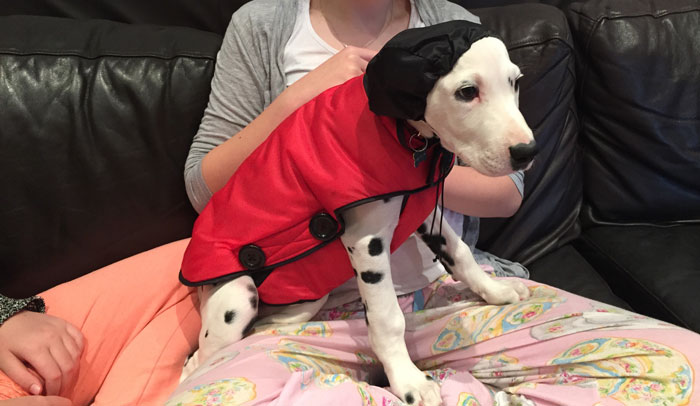
So the big question now is 'how is he going to go when we take off on our next road trip?'
We want to take him with us because he's part of the family now but we have no experience at travelling with dogs.
It's a question I know others have too because we get emails and messages from people quite often asking for tips and advice.
Next month me and the girls and Buddy are heading back up to Lake Argyle on a 3 week road trip which will be both a holiday and a chance for me to shoot some new footage for an update to our film, Discovering Lake Argyle.
The girls and I have had numerous road trips together and managing them by myself is a challenge enough.
Now I have a puppy on board as well . . . it's fair to say I'm a little nervous about how it's going to go.
So I've done some home work and found a great book called Bush Camping With Dogs written by John Frith.
It's exactly what I was looking for - plenty of tips and advice for travelling and camping with dogs and over 1300 free and low cost dog friendly camp sites across Australia.
6 tips I've picked up from Bush Camping With Dogs:
1. Get your dog used to longer car trips before you go
Some dogs can get car sick on longer trips so it's worth taking your dog on some trips to get them used to it before taking off across the country. It's also a good idea not to feed your dog just before you put him in the car to avoid him vomiting all over the upholstery or passengers.
We've already taken Buddy on a return trip between Adelaide & Melbourne and he was happy to sleep most of the way. One issue we still haven't solved is that he's toilet trained to do his business outside at home but he doesn't like going anywhere else.
He basically holds onto it until we get home.
I'm pretty sure he won't be able to hold onto it for 3 weeks though so this trip will probably be the time that we solve this problem.
2. Take a good supply of their food and their own food and water bowls
Continuing to feed them the food they are used to will reduce the 'change stress' they are experiencing and also minimise the chance that they will get sick or not be interested in different food.
Our puppy eats pretty much everything we give him without any issues but his main diet is a meat, veggie and rice casserole I make for him in batches every week. I'll take enough to last him a week then plan to make a couple more batches along the way.
3. Make sure he is micro chipped & your phone number is on a tag on their collar
There is a greater chance of him wandering off and getting lost while you're travelling so hang a metal tag off his collar with his name and your mobile number on it so if someone finds him they can call you.
Vets will also be able to read the microchip and look up your details in the database.
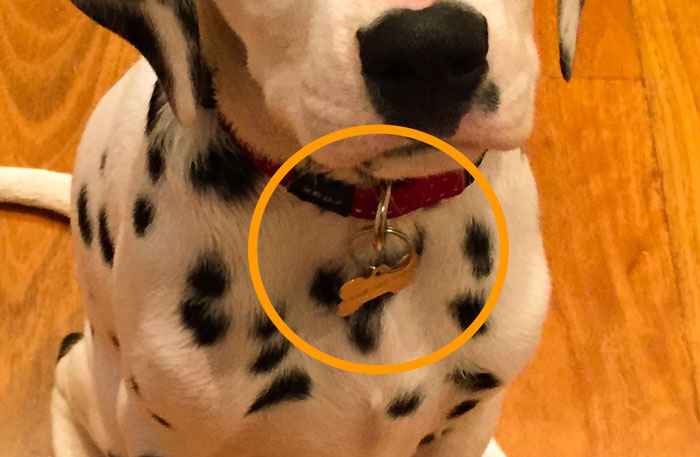
4. Take a doggy first aid kit
Dogs have different first aid needs to humans and John has included a great list of things to include in a 'doggy first aid kit' in 'Bush Camping With Dogs'.
Include your vets phone number in the kit as well so you can call them for advice if you need to.
5. Make sure they are wormed, fully vaccinated and take copies of the vaccination certificates
There is increased risk of them catching diseases or worms while you are travelling due to the exposure to other dogs and animals so making sure they are fully wormed and vaccinated is critical.
If you are heading to Tasmania you'll need to have him treated for hydatid tapeworm within 14 days before you go.
6. Take their bedding from home
They'll feel more 'at home' and sleep better at night if they have their own bed which they are used to.
I'm going to buy a collapsible crate like the one below for Buddy and get him sleeping in it a few weeks before we go so that we can take it with us and it will be his bit of familiar 'personal space'. We can also use it to contain him if we need to.
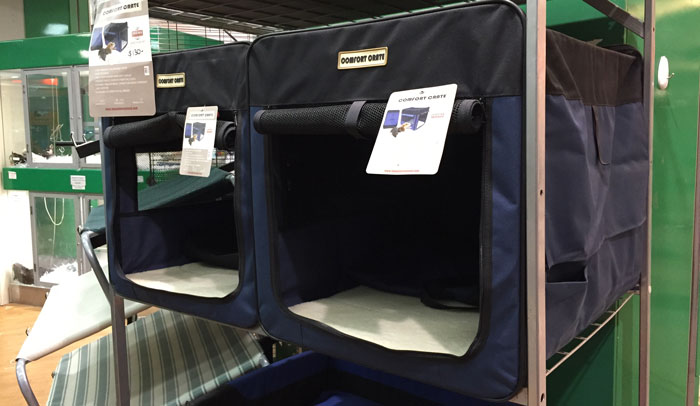
Read More: How to take your dog on road trips and still visit National Parks

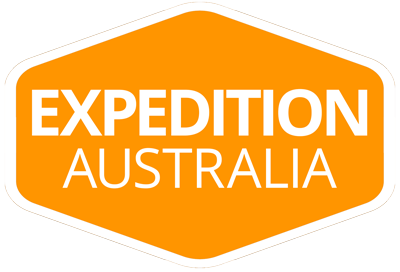
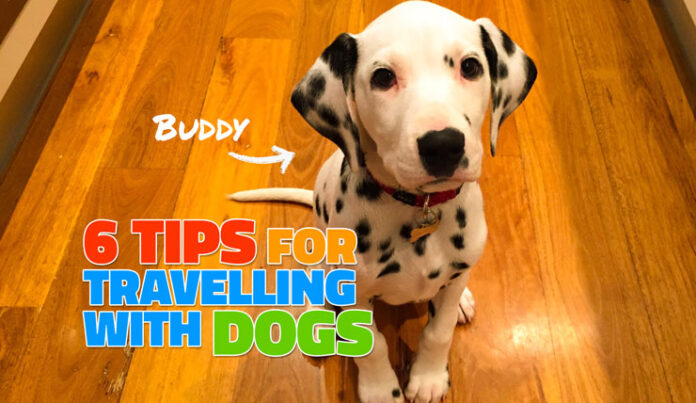
My husband and I are traveling around oz with our 6 year old kelpie. He loves being close by us, so it's important that whenever we stop somewhere (even just a quick 5min toilet break) we let him out so he feels involved. Taking him to markets and other busy areas is helping him get used to being around new places with lots of things to sniff. Probably would have benefited from doing this at home leading up to our trip.
Best tip is water. Make sure you stop regularly and let your mate have plenty to drink.
1: Remember to pick up the dog's bowl after a road stop, as well as the kennel. Have found both in the past when others have left them behind.
2: National Parks are out of bounds for dogs, any size. Unfortunately we found this out by experience. Also, the signs that dogs are not allowed in are well inside the park boundaries, thus creating turn-around issues if towing.
3: Train your dog to be silent if you are not around. Spent hours in a Kununnurra caravan park being annoyed by the incessant barking of a dog whose owner had gone fishing. Not cool.
Dogs are fantastic company, and the reaction to new experiences for them can be entertaining as well.
We have been travelling for 10 weeks so far with 2 Maltese-Shitzu. So they could see out the window and get fresh air, I purchased a cot mattress on E bay and placed it on the back seat, then they are clipped in with a harness, they can then sleep in comfort & safely. Also agree with the previous comment.
Victoria's advice is good. We took our 2 yr old Weimaraner on a 24000km trip in 2013. Our advice:
Make sure your dog is well socialised with other dogs, and is used to lots of other people being around. See how he is in water before you go - don't force him - he'll take to it and swimming when he's ready.
We tried a collapsible crate - he ate his way out the first night. When we are travelling we don't use a crate now, although we have a large metal crate at home, which is his refuge. When we are travelling he has the back seat, using a Roadie harness, has a raised dog bed for sleeping out when we are at the van, and sleeps on the floor of the van on his usual mattress at night. Take a decently long lead so you can tie him up when you're at the van but he can still move around.
Make sure he has plenty of clean water especially when you're up north. And watch how much you feed him - you don't want a fatty, so nothing off the BBQ!
Keep up his and your exercise as well.
Make sure you pick up after him.
Many café's are happy for you to eat & drink with your dog, but we always ask first.
Buddy looks a cracker - just a weim with a different coat! you'll all have fun!
Cheers
Hi Steve, we are off on a trip with our cavvies tomorrow. We always keep extra towels on hand just in .case the dogs take an unexpected dip somewhere & don't forget a nice soft Brush. I am a dog groomer and always have a bottle of flea shampoo with us, I have been to areas where there might be a severe flea infestation (this can occur in long grassy areas as well as sand) there is nothing worse than a dog scratching all night covered in Fleas. Congratulations on the arrival of Buddy, he looks really gorgeous. We hope you all have many years of travelling adventures together
Cheers
We are keen campers with a dog and will not go to a spot unless we can take our pooch with us!
In our experience, taking her own bed is the biggest asset.
We've travelled with our old faithful 9 year old great dane x mastiff to many places since the first day we got her. Unfortunately we lost her last year and our family has been joined by an energetic little Jack Russell Terrier.
Our new little Nessie has taken to camping so easily and having her bed (raised off the ground with shade cloth material covering) is a saviour.
Having somewhere for her to go when we ask her to, makes camping with a dog so much easier. It also acts as a "break zone" when we tie her up close to it for a day sleep, especially if she has been extremely active in the morning. We live in Far North Queensland so it's hot up here, especially in the bush.
Also, if we are leaving early hours of the morning, we will not feed our dog until our first stop at morning tea, or until we have arrived at our destination. This reduces the possibility of car sickness or the need to use the loo. If you do feed your doggy in the morning, stop 10 minutes down the road to use the toilet.
Be aware of 1080 baits at all times .
This is the best advice. 1080 baits scare the crap out of me.
Yes and I wonder do people know that they can look just like a bit if twig. Very dangerous with a puppy ago is at the chew everything stage.
12 yr old Maltese use to a boat, swapped to caravan, big walk before travelling,( so she sleeps,)water and wee stops every 2-3 hrs, dog snacks available,in the car (for when we eat so she doesn't get ours) don't change diet, put her in the car when hitching up, don't leave in car or caravan alone unattended, check for ticks daily. We nearly lost her to paralysis ticks NSW South coast. Very expensive mistake!
We have started caravanning with our two dogs, a German Shepard, and a Jack Russel (yes they are twins). They have taken to the lifestyle easily (although they are quite mature). There are some excellent points made by the others, but add my 2 cents worth:
1. Tick treatment - it is most important, especially for pups - we recently moved to QLD from Vic, and have heard some horror stories with ticks - take no chances - we use a monthly tablet called Nexgard, the big pet supply chains sell them, and the dogs think its a treat, so easy to administer.
2. Our German Shepard doesn't like to "go" away from home either, but we have found he adapted very quickly - we take them for a quick walk every hour or so to give them a chance (along with the key word "piddles" which we use at home as well), and they learnt what it was about within a couple of days.
3. Always keep him on a lead - dogs are unpredictable, he might be friendly enough, but if a free dog approaches a restrained dog, the restrained can feel under threat straight away and get defensive - causes stress for everyone.
4. Don't leave the dog alone. Most places don't allow it anyway, but its not fair on the dog (and the people that have to hear him bark and cry).
5. Enjoy having your new best mate along - they are awesome.
PS We are about halfway through watching your big lap, looking forward to the day we can do it ourselves - really enjoying it.
Oh how we wish our dog could travel in the car without spewing up on every trip. When we call out car ride, Scruffy gets very excited, but alas, as per usual, chukka-chundda with-in 5 klms. We now give her sedatives from the vet, knocks her out in a dozy stupor, half asleep, bit wobbly on the legs at destination, but no chundering.
Poor Scruffy, if only there was a cure for doggy car sickness
Great site. Good advice. This is the first trip away for our dog and everything is too Interesting for her to take time out for toileting.
Any ideas please. She has her normal food and frequent water.
We are currently planning to do the big lap (tentative departure date dec 2016) with 2 dogs (huskies). Weve camped for years with them amd perhaps my tips would be:
1.) Adequate shade / shelter in the peak heat. Ours tend to disappear under the truck
2.) Defintely apply regular tick prevention
3.) Keep on a lead particularly in campsites. Nothing worse when a dog comes over, knocks over your table or pees up your tent.
4.) Check signage and restrictions. Most national parks are off limits (from memory a few places in the otways permit dogs) but most areas have decent spots in state forests and most suburbs along the coast have both on / off leash and time share beaches to enjoy.
We are actually building a website that we plan to document dog friendly campsites, beaches and parks with pictures and videos as part of our plan and motivation to tour oz. I can send you the link when its live.
HI DAN, PLEASE LET ME KNOW WHEN YOU DOG FRIENDLY CAMPSITES, BEACHES AND PARKS IN AUSTRALIA COMES ONLINE. MANY THANKS AND TERRIFIC. WENDY
HI DAN, PLEASE LET ME KNOW WHEN YOU DOG FRIENDLY CAMPSITES, BEACHES AND PARKS IN AUSTRALIA COMES ONLINE. MANY THANKS AND TERRIFIC. WENDY
PS. and one more question please Dan .. in your book Bushcamping with Dogs is there a section on Tasmania? I am planning to travel with my dog around Tasmania and do some free camping as well prior to venturing further to the big island. Many thanks for your inspiration and information and others comments. Wendy
sorry for the multiple postings .. 🙂
Hello Dan,
.. in the book Bushcamping with Dogs is there a section on Tasmania? I am not finding the information so far.
I am planning to travel with my dog around Tasmania and do some free camping as well prior to venturing further to the big island. Many thanks for your inspiration and information and others comments. Wendy
Yes please could I have the link too
Hi can I have your website. We are planning a trip around Australia with our dog, we would appreciate reading any advice you have. First hand experience is always the best. Many thanks Lyn
We travel in our caravan with 2 golden retrievers, one boy and one girl. Both have learned to squat and pee rather than do the boy thing. Our buggest problem is they want to meet and greet everyone and bark at every animal. Both our dogs are rescues and Missy is relatively good, but Ridge is an unknown as we got him when he was 3 years old. We know he was on a puppy breeding farm and everything he sees esp in the outback he barks at. He has never seen these creatures etc. Neither dog would hurt anyone or any other animal. We have had Missy since she was 8 months. She's now 5 and Ridge is almost 7 years old.
Would we consider leaving them at home. Absolutely not. So we can't go into national parks, don't care.
Australia is a huge place of which we have to do Adelaide to Perth and up the west coast next.
We absolutely love travellibg and as the old saying goes "don't leave town til you've seen the country ".
Wanting to go to Tasmania with our Kelpie (when we travel will be 17th months old) What will we be missing out on if we take her. Has anyone done this we are from Sydney and will be going to Tassie via the boat with our 4 x 4 and camper. Can you go into Port Arthur for example with her on a lead. We travel a lot now with our two dogs so that is not a problem. We will be gone for 3-4 weeks and i don't want to not be able to see everything.
Hi. I want to do the opposite. I want to take my dog and from tassie to vic then all around aust. Any tips would be great
Thanks for all your tips everyone (please keep them coming). We had been planning for our first ever family caravan road trip from Melbourne to Cairns and back next year (4 months round trip), with our 10-year-old child - and then I rescued a dear little dog (who is now extremely attached to me and very much part of our family). ' Don't worry, it'll be fine', I said to my hubby. 'We can just organise to stay at pet-friendly places, I'm sure there are heaps of them around' I said. Raised eyebrows from hubby.... So I started to get info on pet-friendly caravan parks, free camping sites etc. Hmmmm, not as many places to stay at as we had before, but still plenty of pet-friendly ones, that is good....hang on a minute, what are all these conditions to the term 'pet-friendly'? Hmmm, maybe this is not going to be as easy as I had first anticipated! More raised eyebrows from hubby..... Best I do a lot more research and make a lot of phone calls! So this is where I am at, researching websites and forums to get helpful(good and not so good) tips from those of you who have first-hand experience travelling with your pets....
How did your trip go?
Great post and the comments on here are even better! We are heading off around Oz soon and I would welcome any advise of K9 accommodation options from anyone travelling Oz but not always camping. Has anyone done AirBnB, dog-sitting or farm stays?
There are some great sites around now for dog sitting as well like Pawshake which we will probably use.
One thing that is rarely mentioned is the potential for dogs to consume a 1080 bait whilst travelling. Regardless of your thoughts on the use of baits, this is a reality in rural Australia and
land managers have a legitimate need to use them to protect their livestock from the impacts of wild dogs and foxes.
If you're taking your pet on a trip, I would recommend that you purchase a good quality muzzle that prevents it being able to consume a bait. Dogs quickly become accustomed to wearing them and it may save a potential disaster if your dog is exposed to a bait.
I think all people should ask before approaching any animal. I went half way around OZ with two besties. It amazed me the way they adapted to the lifestyle and actually became the lifestyle. People have written how their dogs know how and when to travel drink and feed times. I think it is because they feel particularly attached to travelling. Dogs in the wild would be wild and see lots of country. They would feel so special swimming in wild rivers and untouched stretches of beach. Open spaces not house lined pavements riddled with fences and every man and his dog! Clustered together. I think they like the attraction and novelty of the gentle camp set up. Unfortunately my dog was killed by a council. Personally I reckon he was just jealous because he hadn't the tour of OZ done yet with canine companion! I took my bush camping with dogs manual and I will not regret the glorious sights some won't see right around us. Well worth the effort and the spots are Excellent. I only wish I had a human companion Doggy is The best but just not the same:)
Many info centres keep lists of local pet sitters so that your dog can be cared for while you check out the national parks. Also there are useful sites such as Pupsy and madpaws.
Make sure your dogs has had tick preventative medication ... lot of paralysis ticks about and treatment is expensive and potentially deadly if they get a tick.